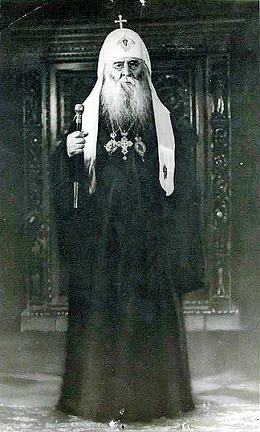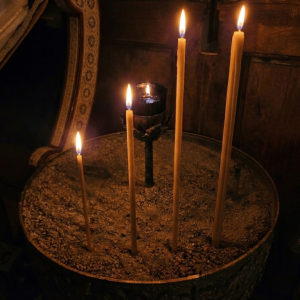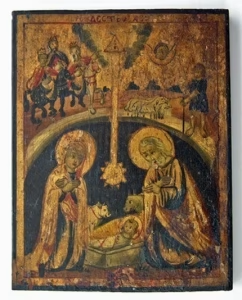“DEMONIC GRACE” AND METROPOLITAN SERGIUS

by Dr. Vladimir Moss
“It is no secret that the Moscow Patriarchate was infiltrated by imposter clergy during various stages of its existence. Needless to say, they possessed demonic grace…”
This extraordinary oxymoron we find in an article by ROCOR Archpriest Nicholas Dalinkiewicz of Melbourne that was written in reply to Fr. Nikita Grigoriev’s “Russian Orthodox Church Abroad, The Beacon of Light (Revised)”. [1]Fr. Nikita’s sharp, incisive exposure of the falsehood of the arguments in favour of the ROCOR-MP unia has obviously rattled the uniates. Fr. Nicholas’ long, wordy and rambling reply was equally obviously meant to counter the invigorating effect Fr. Nikita’s article has had on the anti-uniate struggle. Not that he admits that this is his purpose: he claims to be neither pro- nor anti-unia, but loftily neutral, “above the fray” and motivated by a purely rational and emotionless objectivity. But qui s’excuse s’accuse – Fr. Nicholas would have done better to remain out of the fray altogether rather than to betray such astonishing theological ignorance (not to use a more pejorative word).
Let us be clear: grace is Divine, grace is God Himself, according to the Holy Fathers. Therefore it cannot be demonic or possessed by demons, or by the followers of the demons. An imposter cleric is clearly a follower of the demons, and so he cannot have grace. For “what concord hath Christ with Belial?” as the Apostle says (II Corinthians 6.15). There can be no concord, no union, because “God is light, and in Him is no darkness at all” (I John 1.5).
A ROCOR Archbishop once said to the present writer: “[The MP’s] Patriarch Pimen certainly has grace – it is another matter how he uses it.” With these words he betrayed the fact that he did not understand what grace is. Grace cannot be used; it is not some kind of neutral substance, like electricity or plasticine, which can be used for good works or bad. Indeed, the very idea that God in His Divine and uncreated energies can be used in any way is blasphemous. God is the Almighty Sovereign: He is not used by anyone or anything but is in complete control of everyone and everything. Grace works together with the good will of man to produce good works. It can never, ever be used by evil men for evil works.
Perhaps that error was just a slip of the tongue. But Fr. Nicholas’ error is worse than the archbishop’s and cannot be so easily excused. “Demonic grace”?! The idea is as contradictory as the idea of a holy devil or an evil God. Perhaps Fr. Nicholas is being ironic, perhaps he is indicating the impossibility of a KGB agent in a cassock being a true priest of God? Unfortunately not – there is no trace of irony in his words, and the whole thrust of his argument is that these KGB agents in cassocks are indeed true priests of God…
A further clarification is necessary here: when Fr. Nicholas speaks about “imposter clergy” here he is not talking about merely sinful clergy – that is, all clergy without exception, for there is no man, and no priest, without sin. Sin in a general sense drives away grace, but the grace of the priesthood remains in the sinful priest provided he remains in the true faith and the True Church, for the sake of that faith and that Church. As Fr. Nikita writes, “the fact that many of the MP hierarchy are apparently of questionable moral character is certainly not the actual reason why the Russian Church Abroad cannot unite with them.” It is not because they are sinners that the True Church cannot unite with them but because they are imposters – that is, agents of Belial posing as servants of Christ. And for the servants of Christ, there can be no union with them…
However, Fr. Nicholas implies that these imposters were the exception rather than the rule and that the vast majority of bishops and priests in the MP were, and are, decent, right-believing people. In particular, he devotes a lot of space to justifying Metropolitan Sergius, even describing his notorious declaration as “of Divine inspiration”! Let us examine this claim in detail.
The question of Metropolitan Sergius and his declaration will not go away, hard as the MP tried to remove it from the agenda of negotiations. And rightly. For it is the crucial question, the question that caused the schism in the first place, and the question that must be resolved in accordance with Divine Truth if the unia is not to go down in Church history as one of the greatest betrayals of all time.
First, it is necessary to establish that Metropolitan Sergius’ declaration was not a “one-off” slip, a moment of weakness that tarnished the career of an otherwise honourable hierarch. Metropolitan Sergius was notorious as an ambitious intellectual flirting with the revolutionary left long before the revolution of 1917. He betrayed the Church and undermined the authority of the Church hierarchy at least three times before the ultimate betrayal which was the declaration of 1927.
1. Sergius Before the Revolution. The first betrayal was in 1901, when the Holy Synod anathematized the novelist Lev Tolstoy in the following words: “In his writings Count Lev Tolstoy has blasphemed against the holy sacraments, denying their grace-filled character, has not venerated the Orthodox Church as his Church, has spoken evil of the clergy, has said that he considers that to venerate Christ and worship Him as God is blasphemy while saying of himself, by contrast: ‘I am in God, and God in me’. It is not the Church that has rejected him, casting him off from herself, but he himself has rejected the Church: Lev himself has of his own will fallen away from the Church and is no longer a son of the Church, but is hostile to her. All attempts of the clergy to admonish the prodigal have failed to produce the desired fruits: in his pride he has considered himself cleverer than all, less fallible than all and the judge of all, and the Church has made a declaration about the falling away of Count Lev Tolstoy from the Russian Orthodox Church”.[2] Tolstoy was, in essence, a Protestant, who stood for a Christianity reduced to “pure” morality without the Church or the sacraments. He not only preached his own Gospel (according to his own translation published in Geneva), and created his own sect: he also subjected the teaching and the sacraments of the Orthodox Church to ridicule, as in his novel Resurrection.
Tolstoy was opposed among the clergy especially by St. John of Kronstadt, who wrote of him that he had “corrupted his moral personality to the point of deformity and mortification”, and that he had “made himself into a complete savage with regards to the faith and the Church, because of his lack of education in the faith and piety since his youth.” St. John appealed for help: “Holy warriors of the heavenly Church, take up arms, take up arms for the Church of God on earth. She, the beloved bride, is impoverished, she suffers from the savage attacks on her from the atheist Lev Tolstoy…”
However, Bishop Sergius (Stragorodsky), then a rising star of the Russian Church, took a different view. G.M. Soldatov writes: “Sergius compared Lev Tolstoy to Julian the Apostate, whom, as he said, no council had condemned and who had not been excommunicated, but who was an apostate from Christianity. For that reason, he said, ‘it was not necessary to excommunicate Tolstoy, since he himself consciously left the Church’…”[3] If this reasoning were correct, it would not be necessary to anathematize any heretic, since it could be argued that he had already left the Church. Then it would also not be necessary to anathematize Arius or the Iconoclasts – or the Bolsheviks…
But Sergius’ reasoning here is less important than the way in which he finds clever arguments to place himself in accord with the fashionable opinion of the time, the opinion of the liberals, and the intellectuals. We find this ability to “jump on the bandwagon” again and again in his career, and it was undoubtedly because of this ability that Sergius was made chairman of the series of religio-philosophical meetings which began in 1901 and which enabled Church liberals and heretics to voice their opinions in public for the first time. “Sergius,” writes Soldatov, “was popular in circles waiting for the introduction of ‘democratic’ reforms in the State. In his sermons and speeches, he criticized the relationship between the ecclesiastical and state authorities in the Russian Empire.”[4]
Now it was not only liberals and future renovationists who were calling for reform in the relationship between Church and State. The conservative revolutionary-turned-monarchist L.A. Tikhomirov also published an article at this time arguing that the State should “give the Church independence and the possibility of being the kind of organization she must be in accordance with her own laws while remaining in union with her”.[5] The problem was that both conservatives and liberals could argue for Church reform, but for completely different motives. Tikhomirov wrote as one who had seen the revolution from within, and turned away from it with all his heart, acknowledging the only true defense against it to be the strengthening of Church consciousness among the people.[6] The liberals, on the other hand, were motivated, not by a desire to see the Church free and therefore able to exert a more powerful influence on society, but rather the opposite: a desire to humble the State and destroy the Church’s influence once and for all. As for the liberal bishops such as Sergius, they leapt onto the bandwagon of the reform of Church-State relations, and of what later came to be called renovationism, in order to further their own careers.
Sergius was leftist in both the ecclesiastical and political senses. Thus he took a very active part in the work of the society for the rapprochement of the Orthodox and Anglican Churches. And his views on salvation caused controversy. One of his earliest critics was the future New Hieromartyr Archbishop Victor of Vyatka. He noted already in 1912 that the “new theology” of Bishop Sergius “would shake the Church”. Later, after Sergius issued his disastrous declaration of 1927, Archbishop Victor saw in it a direct result of Sergius’ pre-revolutionary teaching on salvation.[7]
Again, “when in 1905 the revolutionary professors began to demand reforms in the spiritual schools, then, in the words of Metropolitan Anthony (Khrapovitsky), ‘his Grace Sergius… wavered in faith.’”[8] And when the revolutionary Peter Schmidt was shot in 1906, Archbishop Sergius, who was at that time rector of the St. Petersburg Theological Academy, served a pannikhida at his grave. He also gave refuge in his hierarchical house in Vyborg to the revolutionaries Michael Novorussky and Nicholas Morozov (a participant in the attempt on the life of Tsar Alexander II). Having such sympathies, it is not surprising that he was not liked by the Royal Family.[9]
Sergius was in favour of many of the innovations that were later to be introduced by the heretical “living church” renovationists. Thus among the suggestions made to the Pre-Conciliar Commission preparing for the Council of the Russian Orthodox Church that eventually took place in 1917-1918, we read of “a suggestion of the clergy of the cathedral of Vyborg on the longed-for reforms, presented by Archbishop Sergius of Finland to the Holy Synod on January 18, 1906:
* On the reform of the liturgical language: the future Council must debate the question of the simplification of the language of the Church, Slavonic, and the right accorded to the parish that wants it to serve the Divine offices in that language.
* It must think of abbreviating and simplifying the Typicon, and suppressing certain ritual actions, such as the breathing and spitting during the sacrament of baptism.
* It must think of abolishing the multiple repetitions of the same litanies during the same service and replacing them by reading aloud the secret prayers during the Liturgy.
* It must think of giving priests [who have been widowed before the age of 45] the right to remarry.”[10]
2. Sergius During the Revolution. Already on March 7, 1917, Sergius, now Archbishop of Finland, supported the new Church Procurator, Prince Vladimir Lvov, in transferring the Synod’s official organ, Tserkovno-Obshchestvennij Vestnik (Church and Society Messenger), into the hands of the “All-Russian Union of Democratic Orthodox Clergy and Laity”, a left-wing grouping founded in Petrograd on the same day of March 7 and led by Titlinov, a professor at the Petrograd Academy of which Sergius was the rector.[11] Archbishop (later Patriarch) Tikhon protested against this transfer, and the small number of signatures for the transfer made it illegal. However, in his zeal to hand this important Church organ into the hands of the liberals, Lvov completely ignored the illegality of the act and handed the press over to Titlinov, who promptly began to use it to preach his Gospel of “Socialist Christianity”, declaring that “Christianity is on the side of labour, not on the side of violence and exploitation”.[12]
On April 14, a stormy meeting took place between Lvov and the Synod during which Lvov’s actions were denounced as “uncanonical and illegal”. At this session Archbishop Sergius apparently changed course and agreed with the other bishops in condemning the unlawful transfer. However, Lvov understood that this was only a tactical protest. So he did not include Sergius among the bishops whom he planned to purge from the Synod. He thought – rightly – that Sergius would continue to be his tool in the revolution that he was introducing in the Church.
The next day Lvov marched into the Synod at the head of a detachment of soldiers and read an order for the cessation of the winter session of the Synod and the retirement of all its members with the single exception of Archbishop Sergius.[13] Thus in little more than a month since the coup, the Church had been effectively placed in the hands of a lay dictator, who had single-handedly dismissed her most senior bishops in the name of the “freedom of the Church”.
On April 29, the new Synod headed by Archbishop Sergius accepted an Address to the Church concerning the establishment of the principle of the election of the episcopate and the preparation for a Council and the establishment of a Preconciliar Council. This Address triggered a revolution in the Church. The revolution consisted in the fact that all over the country the elective principle with the participation of laymen replaced the system of “episcopal autocracy” which had prevailed thereto. In almost all dioceses Diocesan Congresses elected special “diocesan councils” or committees composed of clergy and laity that restricted the power of the bishops. The application of the elective principle to almost all ecclesiastical posts, from parish offices to episcopal sees, resulted in the removal of several bishops from their sees and the election of new ones in their stead. Thus Archbishops Basil (Bogoyavlensky) of Chernigov, Tikhon (Nikanorov) of Kaluga and Anthony (Khrapovitsky) of Kharkov were removed. Archbishop Joachim (Levitsky) of Nizhni-Novgorod was arrested and imprisoned for a time before being shot. The retirement of Archbishop Alexis (Dorodnitsyn) of Vladimir was justified by his earlier closeness to Rasputin. The others were accused of being devoted to the Autocracy.[14]
Although the spirit of this revolutionary wave was undoubtedly anti-ecclesiastical, by the Providence of God it resulted in some beneficial changes for the Church. Thus the staunchly monarchist Archbishop Anthony, after being forced to retire, was later reinstated at the demand of the people. Again, Archbishop Tikhon (Bellavin) of Lithuania was elected metropolitan of Moscow (the lawful occupant of that see, Metropolitan Macarius, was later reconciled with him), and Archbishop Benjamin (Kazansky) was made metropolitan of Petrograd. However, there were also harmful changes, such as the replacement of Archbishop Alexis of Vladimir by – Archbishop Sergius. The electors in Vladimir rejected beforehand all candidates who had displayed monarchist or “reactionary” tendencies before the revolution. The liberal Sergius was, therefore, a natural choice… [15]
3. Sergius After the Revolution. So far we have seen how Sergius harmed the Church without waging open war against it. However, on June 16, 1922, he was one of three important hierarchs who joined the schismatical “Living Church”, declaring: “We, Metropolitan Sergius [Stragorodsky] of Vladimir and Shuya, Archbishop Eudocimus of Nizhegorod and Arzamas and Archbishop Seraphim of Kostroma and Galich, having studied the platform of the Temporary Church Administration and the canonical lawfulness of its administration, consider it the only lawful, canonical, higher church authority, and all the instructions issuing from it we consider to be completely lawful and obligatory. We call on all true pastors and believing sons of the Church, both those entrusted to us and those belonging to other dioceses, to follow our example.”
Sergius was a full and conscious participant in the renovationist councils that praised Lenin and the revolution and “defrocked” Patriarch Tikhon. And his apostasy persuaded many others to apostatize. As the sergianist Metropolitan John (Snychev) admits: “We do not have the right to hide from history those sad and staggering apostasies from the unity of the Russian Church which took place on a mass scale after the publication in the journal ‘Living Church’ of the epistle-appeals of the three well-known hierarchs. Many of the hierarchs and clergy reasoned naively. Thus: ‘If the wise Sergius has recognized the possibility of submitting to the Higher Church Administration, then it is clear that we, too, must follow his example.’”[16]
On July 15, 1923, Patriarch Tikhon anathematized the renovationists, after which the movement began to decline sharply. Metropolitan Sergius now hastened (and yet not very quickly, as Hieromartyr Bishop Damascene of Glukhov pointed out[17]) to make public confession to the Patriarch.
The Patriarch received Sergius in the following way. He explained that it was his Christian duty to forgive him, but that since his guilt was great before the people also, he had to repent before them, too. Then he would receive him with joy and love. And so he stood throughout the liturgy in simple monastic garments without his Episcopal mantia, klobuk, panagia, and cross. At the end of the liturgy, he was led by the Patriarch out onto the amvon where he bowed to the people three times, after which the Patriarch restored to him his panagia with cross, white klobuk, mantia, and staff.[18]
Sergius appeared to have repented. But the renowned Elder Nectarius of Optina prophetically said that, even after his repentance, the poison of renovationism was in him still.[19]
After his fall from grace and public repentance in 1923, we would have expected Metropolitan Sergius to lie low, and attempt to hide the ambition that clearly propelled him. But no: only three years later, Sergius attempted to seize the position of first-hierarch in the Church uncanonically. For in 1926, while he was deputizing for Metropolitan Peter, the patriarchal locum tenens, Metropolitan Agathangelus, another of the three locum tenentes appointed by Patriarch Tikhon, returned from exile and asked Sergius to hand over to him the reins of power. Sergius refused, although Agathangelus’ claim was just. Eventually, seeing that Sergius was stubborn and that a schism threatened, Agathangelus yielded “for the sake of the peace of the Church”.
The astonishing extent of Sergius’ usurpation of power is revealed in his fifth letter to Agathangelus, dated June 13, in which he refused to submit even to Metropolitan Peter insofar as the latter, “having transferred to me, albeit temporarily, nevertheless in full, the rights and obligations of the locum tenens, and himself being deprived of the possibility of being reliably informed of the state of ecclesiastical affairs, can neither bear responsibility for the course of the latter nor, a fortiori, meddle in their administration… I cannot look on the instructions of Metropolitan Peter that have come out of prison as other than instructions or, rather, as the advice of a person without responsibility [italics mine – V.M.].” A sergianist has commented on this letter: “It turns out that, once having appointed a deputy for himself, Metropolitan Peter no longer had the right to substitute another for him, whatever he declared. This ‘supple’ logic, capable of overturning even common sense, witnessed to the fact that Metropolitan Sergius was not going to depart from power under any circumstances.”[20]
The Declaration of Metropolitan Sergius. In the context of Sergius’ earlier career, his declaration of 1927 comes as no surprise. His surrender to the Bolsheviks in 1927 was entirely in character with his surrender to the liberals before 1917, to the Provisional Government in 1917, to the renovationists in 1922, and to his personal ambition in 1926. The fact is: Sergius had never confessed the truth in face of the Zeitgeist. Clearly, as even sergianist sources admit, he wanted power, and, having attained it, was prepared to make the sacrifices with his conscience required in order to retain it.
Fr. Nicholas will have none of this. He believes that the wording of the declaration has been misunderstood (“by virtually every person that has ever formed an opinion about the Declaration”!), that it was in fact the best he could have done in the circumstances (“the precise wording of his Declaration must have involved Divine inspiration”!), and that it doesn’t matter anyway because “the end result would have been much the same whether the Declaration existed or not”! But the end result, it cannot be denied, was a Church schism of massive proportions, and the sending to prison and death of thousands of clergy and laity who refused to accept the declaration and who were labeled as “counter-revolutionaries” by Sergius for rejecting it. Surely, Sergius cannot be absolved of all responsibility for that?! And if he can, and Fr. Nicholas is right in his justification of the declaration, then are we not led to the inescapable conclusion that it was a grave sin to reject the declaration and that both the Catacomb Church and the Russian Church Abroad became schismatics for rejecting it and the Church that issued it?!
One cannot have it both ways. Either the declaration was a betrayal of the truth, in which case the Catacomb Church and the Russian Church Abroad were right to reject it and break communion with the traitors who accepted it, and the MP must clearly and unambiguously repent of having accepted it (instead of calling it “clever”, as Patriarch Alexis has done). Or, if it can in fact be justified on the grounds Fr. Nicholas has put forward, then the Catacomb Church and the Russian Church Abroad fell into schism, and all the ROCOR clergy, including Fr. Nicholas himself, must repent before KGB agent Drozdov of the mortal sin of schism. But Fr. Nicholas does want to have it both ways. He wants to justify Metropolitan Sergius, – in fact, whitewash him completely, – while saying that it was alright to break communion with him.
Fr. Nicholas tries to get around this dilemma by claiming that the schism was not a schism in the full sense, but only an “administrative division”. Even if this view could be justified (which it cannot – but that will not be argued here), it avoids the primary and critical issue: who was right? If, as Fr. Nicholas argues, Metropolitan Sergius was right to issue his declaration, then there is no escaping the conclusion that the Catacomb Church and the Russian Church Abroad were wrong to break with him, whether we call that break “administrative” or “spiritual”.
Fr. Nicholas goes on: “The fact that Metropolitan Sergius subsequently ‘told lies’ about the state of the Church, merely reflects his inability to cope with pressure applied to him, not only in terms of his personal safety, but the threat of execution of 117 bishops, the menace posed by the Revisionists [sic – renovationists is meant], and the welfare of the Church in general.”
It is necessary to expose this lie that supposedly Metropolitan Sergius had to sign the declaration because otherwise 117 bishops would have been executed. The present writer has found no evidence to support such a claim. Undoubtedly Sergius was threatened, but there is no reason to believe that the threat was any different to those made to other Church leaders who were in his position – Metropolitan Peter, for example. The difference is this: those hierarchs did not succumb to the threat, and therefore suffered martyrdom in their own bodies while not bringing this fate on anyone else, whereas Metropolitan Sergius died in his own bed while thousands of his clergy whom he had denounced as counter-revolutionaries went to the death camps.
This is particularly obvious in relation to Metropolitan Peter, who was, after all, the canonical head of the Church and the first target of the Bolsheviks’ threats. If Metropolitan Sergius had been threatened with the shooting of 117 bishops if he did not sign the declaration, then there is no doubt that Metropolitan Peter would have been threatened in the same way. But he did not sign the declaration, was sent to a slow and horrible death in Siberia – and 117 bishops were not shot. As he wrote on January 22, 1928: “For a first-hierarch such an appeal [as Sergius’ declaration] is inadmissible… It was suggested to me… that I sign the appeal. I refused, for which I was exiled. I trusted Metropolitan Sergius, and I see that I was mistaken…”
What would have happened if Metropolitan Sergius had refused to sign the declaration? Exactly what happened to his predecessors in that position, Metropolitan Peter and Archbishop Seraphim – he would have been sent to prison while the Bolsheviks looked for another candidate for the role of the Russian Judas. After all, if the Bolsheviks had wanted to kill 117 bishops they could have done so without negotiating with anyone about it. But all the evidence is that after the Civil War period (1918-21), the Bolsheviks abandoned the method of direct physical annihilation in favour of the more subtle tactic of subversion of the Church from within. Lenin had rejected the murder of Patriarch Tikhon because, as he said, he did not want to make a martyr out of him like Patriarch Hermogen. Much more useful, much more of a real triumph for Bolshevism was the public recognition, by the Church herself, of the legitimacy of the Bolshevik revolution. Metropolitan Peter, Metropolitan Agathangelus, Metropolitan Cyril, Metropolitan Joseph, Archbishop Seraphim and all the other martyrs and confessors of the Catacomb Church rejected this path. Metropolitan Sergius accepted it. That is the difference between a martyr and a traitor…
Fr. Nicholas quotes a letter from Metropolitan Sergius to Metropolitan Agathangelus in January 1928 as if it proved his good intentions: he pleaded with him not to break with him and to have a little more patience “until it becomes clear where we are leading the ship of the Church: to a relatively bearable existence in the given conditions, or to a catastrophe. In another message, he promised that his uncanonical removals and appointments of bishops and other policies were a temporary expedient that would soon be abandoned once the church situation had been normalized.”[21]
And yet Metropolitan Sergius never did abandon these uncanonical measures, although he lived for another fifteen years. Moreover, his policies quite clearly led to catastrophe rather than “a relatively bearable existence”. As long as the Church, in the persons of her leading hierarchs, refused to compromise with Bolshevism, she suffered but retained her strength. In the words of E. Lopeshanskaia: “The Church was becoming a state within the state… The prestige and authority of the imprisoned and persecuted clergy was immeasurably higher than that of the clergy under the tsars.”[22] But soon after Metropolitan Sergius issued his declaration, the situation changed: a whirlwind descended upon the Church, such a persecution as She has never suffered in the two thousand years of her existence on earth.
What a paradox! That a policy designed to secure “a relatively bearable existence” for the Church in fact led to the greatest shedding of Christian blood in the whole history of the Church’s existence! As St. John of Shanghai and San Francisco (whom Fr. Nicholas likes to quote selectively and out of context) wrote: “The Declaration of Metropolitan Sergius brought no benefit to the Church. The persecutions not only did not cease but also sharply increased. To the number of other accusations brought by the Soviet regime against clergy and laymen, one more was added – non-recognition of the Declaration. At the same time, a wave of church closings rolled over all Russia… Concentration camps and places of forced labor held thousands of clergymen, a significant part of whom never saw freedom again, being executed there or dying from excessive labors and deprivations.”[23]
Even a recent biography of Sergius by an MP author accepts this fact: “If Metropolitan Sergius, in agreeing in his name to publish the Declaration of 1927 composed by the authorities, hoping to buy some relief for the Church and the clergy, then his hopes not only were not fulfilled, but the persecutions after 1927 became still fiercer, reaching truly hurricane-force in 1937-38.”[24]
Not only did Sergius not save anyone (except himself) through his declaration: we have evidence that he personally threatened confessing bishops with death if they did not sign it.
Thus the sergianist Metropolitan Manuel (Lemeshevsky) writes about the Catacomb Hierarch, Bishop Seraphim of Dmitrov and Archbishop Zenobius of Tambov, that they refused to accede to Sergius’ demand that they read out his declaration from the ambon to their flocks, which would have meant that they agreed with the declaration.
“I am morally incapable of doing that which those who do not love Christ the Saviour want,” said Vladyka Seraphim.
“Agree with the proposal,” said Metropolitan Sergius, “otherwise you will not only land up beyond the Arctic circle, but your lot will be three times as bad as that of Metropolitan Peter…”[25]
Another Catacomb confessor, Bishop Arcadius of Lubny, was once secretly in Moscow in the 1930s. Feeling weak and oppressed by constant loneliness, homelessness, and fear of the next day, he was tempted to visit Metropolitan Sergius. In order to see the metropolitan, one had to go through great difficulties and dangers. And when he finally saw him and told him about his situation, the metropolitan, without listening to him, asked abruptly:
“Have you registered with the GPU? Until you are registered there, I will not speak with you.”
As Vladyka Arcadius was leaving the metropolitan’s office, he noted that both the metropolitan and all his clergy were well fed and wore clean clothing. And when he looked around at the miserable, destitute people who were waiting outside his office in the hope of seeing the metropolitan and receiving some help from him, he understood that his path was different and that he had to return to his wandering…
Sergius’ treachery was imitated by his followers. Thus once the Catacomb priest Fr. Sergius Mechev of Moscow, being without a bishop, followed the advice of one of his spiritual sons and opened his heart to Bishop Manuel Lemeshevsky, and in confidence explained to him his church position, thinking that he shared his views. Bishop Manuel was soon arrested, and betrayed Fr. Sergius. During questioning at his trial, the arrested hierarch said that Fr. Sergius was the main instigator of the opposition to Metropolitan Sergius. He also said that he wished to be a loyal Soviet citizen and wanted no trouble. The prosecutor tapped him on the shoulder and said:
“Don’t worry and be upset, Vladyka: you will be of some use to us later.”
After this, he was released and was given the diocese of Orenburg by Metropolitan Sergius…[26]
In August 1936 Sergius assumed for himself the title of Metropolitan of Krutitsa and Kolomna, although Metropolitan Peter was still alive, and also the title of patriarchal locum tenens, although only a lawfully convened Council of the Russian Church could give him that. There is no question about it: his motivation was ambition. And he was prepared to betray his fellow bishops in order to fulfill his ambitions…
Sergius’ ferocity even against his own people continued right to the end of his life. Thus Sergius Shumilo writes that “in October 1941, when the German armies had come right up to Moscow, Metropolitan Sergius issued an Epistle in which he discussed the Orthodox hierarchs and clergy who had made contact on the occupied territories with the local German administration. De facto all the hierarchs and clergy on the territories occupied by the Germans, including those who remained in the jurisdiction of the Moscow Patriarchate, came under Metropolitan Sergius’ excommunication…”[27]
Even patriarchal sources have spoken about the falsity of Sergius’ declaration, the true confession of those who opposed him, and the invalidity of the measures he took to punish them. Thus: “Amidst the opponents of Metropolitan Sergius were a multitude of remarkable martyrs and confessors, bishops, monks, priests… The ‘canonical’ bans of Metropolitan Sergius (Stragorodsky) and his Synod were taken seriously by no one, neither at that time [the 1930s] nor later by dint of the uncanonicity of the situation of Metropolitan Sergius himself…”[28]
And again: “The particular tragedy of the Declaration of Metropolitan Sergius consists in its principled rejection of the podvig of martyrdom and confession, without which witnessing to the truth is inconceivable. In this way, Metropolitan Sergius took as his foundation not hope on the Providence of God, but a purely human approach to the resolution of church problems… The courage of the ‘catacombniks’ and their firmness of faith cannot be doubted, and it is our duty to preserve the memory of those whose names we shall probably learn only in eternity…”[29]
The Consequences of Sergianism
Sergius did not only destroy his own soul by his Judas sin: he created a tradition of spiritual treachery which the Moscow Patriarchate has followed to this day. This tradition has become so second nature to its leaders that they seem quite sincerely to be unaware of it as if it were quite normal. Perhaps such seared consciences are to be expected in a church that has quite obviously been deprived of the grace of God now for generations. But the real tragedy is that ROCOR also has ceased to notice it. How many churches of ROCOR in Russia have been seized by the MP with the aid of OMON forces, even with the death of some clergy? And what about the seizure of the Hebron monastery in the Holy Land and the beating up of Abbess Juliana, accomplished with the aid of KGB-trained Palestinian leader Yasser Arafat? But Fr. Nicholas says nothing about such awkward details except to mouth the resounding lie that “the present regime in Russia offers greater religious freedom in Russia than is available in the West”!
But the most damning legacy of Sergius, and the one that ROCOR uniates try by all means to keep quiet about, is the undoubted fact that the bishops of the Moscow Patriarchate are KGB agents. Many people seem bored by this fact as if it will just go away if we leave it alone. But we need constantly to remind ourselves of the single greatest obstacle to union with the MP – that it is an organization effectively created and run by the most antichristian force in recent history.
Writing in 1995, John Dunlop concluded that “the overwhelming majority of the current one hundred and nineteen bishops of the Moscow Patriarchate were ordained to the episcopacy prior to August of 1991. This suggests that each of these bishops was carefully screened and vetted by both the ideological apparatus of the Communist Party and by the KGB.”[30] Keston College came to the same conclusion.[31]
Former KGB Lieutenant-Colonel Constantine Preobrazhensky confirms this: “Absolutely all [my italics – V.M.] the bishops and the overwhelming majority of the priests worked with the KGB. After all, the Church was considered to be a hostile medium, and it had to be controlled through agents. Even the very mechanism of appointing bishops allowed only agents there.
“Bishops were put into the nomenklatura of the Central Committee of the CPSU, and so each one was confirmed by the Ideological Department. And what department sent documents there for important personnel appointments? You’re right: the KGB. The certificate on the future bishop was prepared by the Fifth administration, which carried out a general watch over the Church, together with the spy service, if he had been even once abroad. Each of the certificates ended with the same phrase: ‘He has been cooperating since such-and-such a year’.
“This was precisely the most important thing for the Central Committee of the CPSU! This phrase witnessed to the fact that the future bishop was not only loyal to Soviet power but was hanging from it by a hook: after all, there are unfailingly compromising materials on every agent! And this means that no dissident outbursts were to be expected from this bishop…”[32]
At the present time, the KGB-FSB is more powerful than ever, and there is no reason to believe that its control of the Church is not as powerful as ever. So the “imposter clergy” are still there in greater numbers than ever. What consequences are we to draw from this undeniable fact?
We shall not draw the blasphemous conclusion made by Fr. Nicholas that the “grace” of these clergy is “demonic”. No, there is no such thing as “demonic grace”. There are demons, and there is grace. But they do not dwell together. The great lie of the Moscow Patriarchate, the great lie of Metropolitan Sergius, is that they can dwell together, that the grace of God can work through an organization created by demons and consciously pursuing demonic ends. Against this great and terrible lie we have to assert the Gospel truth that the Church is “the pillar and ground of the truth” (I Timothy 3.15), the whole truth and nothing but the truth.
As Catacomb Hieromartyr Damascene, Bishop of Glukhov, said: “What will those who have come to the Church say? What will they feel when, even from there, from the height of the last refuge of righteousness rejected by the world, from the height of the ambon, there sound words of hypocrisy, of man-pleasing and slander? Will it not seem that falsehood is achieving its final victory over the world, and that there, in the place where the image of Incarnate Truth flashed for them with the Unwaning Light, there now laughs in a disgusting grimace the mask of the father of lies?
“It is one or the other: either the Church is truly the immaculate and pure Bride of Christ, the Kingdom of truth, in which case the Truth is the air without which we cannot breathe, or, like the whole world which lies in evil, it lives in lies and by lies, in which case everything is a lie, every word is a lie, every prayer, every sacrament…”
February 17 / March 2, 2007.
Hieromartyr Hermogenes, Patriarch of Moscow.
[1] orthodox-synod@yahoogroups.com, February 24, 2007.
[2] Vladimir Gubanov (ed.), Nikolai II-ij i Novie Mucheniki (Nicholas II and the New Martyrs), St. Petersburg, 2000, p. 701 ®.
[3] Soldatov, “Tolstoj i Sergij: Iude Podobnie” (Tolstoy and Sergius: Images of Judas), Nasha Strana (Our Country), № 2786; Vernost’ (Fidelity), № 32, January 1/14, 2006 ®.
[4] Soldatov, op. cit.
[5] Tikhomirov, “Gosudarstvennost’ i religia” (Statehood and religion), Moskovskie Vedomosti (Moscow Gazette), March, 1903, p. 3 ®.
[6] His son became one of the hieroconfessors of the Soviet period, Bishop Tikhon of Kirillovsk.
[7] Hieromartyr Victor, “Novie Bogoslovy” (The New Theologians), Tserkov’ (The Church), 1912; reprinted by Orthodox Action, Moscow, № 1 (11), 2000; Protopriest Michael Polsky, Novie Mucheniki Rossijskie (The New Martyrs of Russia)), 1949-57, Jordanville, vol. 1, p. 601 ®.
[8] “Preemstvennost’ Grekha” (The Heritage of Sin), publication of the parish of the Holy New Martyrs and Confessors of Russia, Tsaritsyn, p. 7 ®.
[9] In 1915 the Empress wrote to the Emperor that Sergius “must leave the Synod” (A. Paryaev, “Mitropolit Sergij Stragorodskij: Neizvestnaia Biographia” (Metropolitan Sergius Stragorodsky: The Unknown Biography), Suzdal’skie Eparkhial’nie Vedomosti (Suzdal Diocesan News), № 1, September, 1997, pp. 12-15 ®.
[10] Suggestions of the Diocesan Hierarchs on the Reform of the Church, St. Petersburg, 1906, vol. 3, p. 443 ®.
[11] As Metropolitan Anthony (Khrapovitsky) testified, “already in 1917 he [Sergius] was dreaming of combining Orthodox Church life with the subjection of the Russian land to Soviet power…” (“Preemstvennost’ Grekha” (The Heritage of Sin), Tsaritsyn, p. 7).
[12] See Mikhail V. Shkarovskii, “The Russian Orthodox Church”, in Edward Acton, Vladimir Cherniaev, William Rosenberg (eds.), Critical Companion to the Russian Revolution 1914-1921, Bloomington and Indianopolis: Indiana University Press, 1997, p. 417; “K 80-letiu Izbrania Sv. Patriarkha Tikhona na Sviashchennom sobore Rossijskoj Tserkvi 1917-18gg.” (Towards the Election of his Holiness Patriarch Tikhon at the Sacred Council of the Russian Church, 1917-18), Suzdal’skie Eparkhial’nie Vedomosti (Suzdal Diocesan News), № 2, November, 1997, p. 19.
[13] Bishop Gregory (Grabbe) wrote: “I can remember the opinions of those who knew him and who considered him to be a careerist and the complaints of hierarchs that he promised to retire with other members of the Synod in protest against Lvov, then he changed his mind and became head of the Synod” (Letter of April 23 / May 6, 1992 to Nicholas Churilov, Church News, April, 2003, p. 9).
[14] Monk Benjamin (Gomareteli), Letopis’ tserkovnykh sobytij Pravoslavnoj Tserkvi nachinaia s 1917 goda (Chronicle of Church Events, beginning from 1917), www.zlatoust.ws/letopis.htm, p. 8 ®.
[15] See Paryaev, op. cit.
[16] Snychev, “Mitropolit Sergij i Obnovlencheskij Raskol” (Metropolitan Sergius and the Renovationist Schism) ®.
[17] E.L. Episkopy-Ispovedniki, San Francisco, 1971, p. 68, note ®.
[18] Parayev, “Istinnoe Pravoslavie i Sergianstvo” (True Orthodoxy and Sergianism), Suzdal’skie Eparkhialnie Vedomosti (Suzdal Diocesan Gazette), September, 1997 http://catacomb.org.ua/modules.php?name=Pages&go=page&pid=544)
[19] I.M. Kontsevich, Optina pustyn’ i ee vremia (Optina Desert and its Time), Jordanville, N.Y.: Holy Trinity Monastery Press, 1971, p. 546 ®.
[20] Za Khrista Postradavshie (Those Who Suffered for Christ), Moscow, 1997, p. 36 ®.
[21] D. Pospielovsky, The Russian Church Under the Soviet Regime, 1917-1982, New York: St. Vladimir’s Seminary Press, 1984, vol. 1, pp. 186-187.
[22] E.L., op. cit., p. 70.
[23] St. John Maximovich, The Russian Orthodox Church Abroad. A Short History, Jordanville, NY: Holy Trinity Monastery, 1997, pp. 28-29.
[24] Sergius Fomin, Strazh Doma Gospodnia (Guardian of the House of the Lord), Moscow, 2003, p. 262 ®.
[25] Metropolitan Manuel Lemeshevsky, Die Russischen Orthodoxen Bischofe von 1893-1965, Erlangen, 1989.
[26] Alla D. “Svidetel’stvo” (Witness), in Nadezhda (Hope), vol. 16, Basel-Moscow, 1993, 228-230 ®.
[27] Shumilo, “Sovietskij Rezhim i ‘Sovietskaia Tserkov’’ v 40-e-50-e gody XX stoletia” (The Soviet Regime and the ‘Soviet Church’ in the 40s and 50s of the 20th Century), http://catacomb.org.ua/modules.php?name=Pages&go=page&pid=678 ®.
[28] M.E. Gubonin, Akty Sviateishago Patriarkha Tikhona (The Acts of his Holiness Patriarch Tikhon), Moscow, 1994, pp. 809, 810 ®.
[29] M.B. Danilushkin (ed.), Istoria Russkoj Pravoslavnoj Tserkvi (A History of the Russian Orthodox Church), St. Petersburg: “Voskresenie”, 1997, vol. I, pp. 297, 520 ®.
[30] Dunlop, “The Moscow Patriarchate as an Empire-Saving Institution”, in Michael Bourdeaux, M.E. Sharp (eds.), The Politics of Religion in Russia and the New States of Eurasia, 1995, Armonk, NY, p. 29.
[31] Felix Corbey, “The Patriarch and the KGB”, Keston News Service, September 21, 2000.
[32] Preobrazhensky, KGB v russkoj emigratsii (The KGB in the Russian emigration), New York: Liberty Publishing House, 2006, p. 41 ®.







